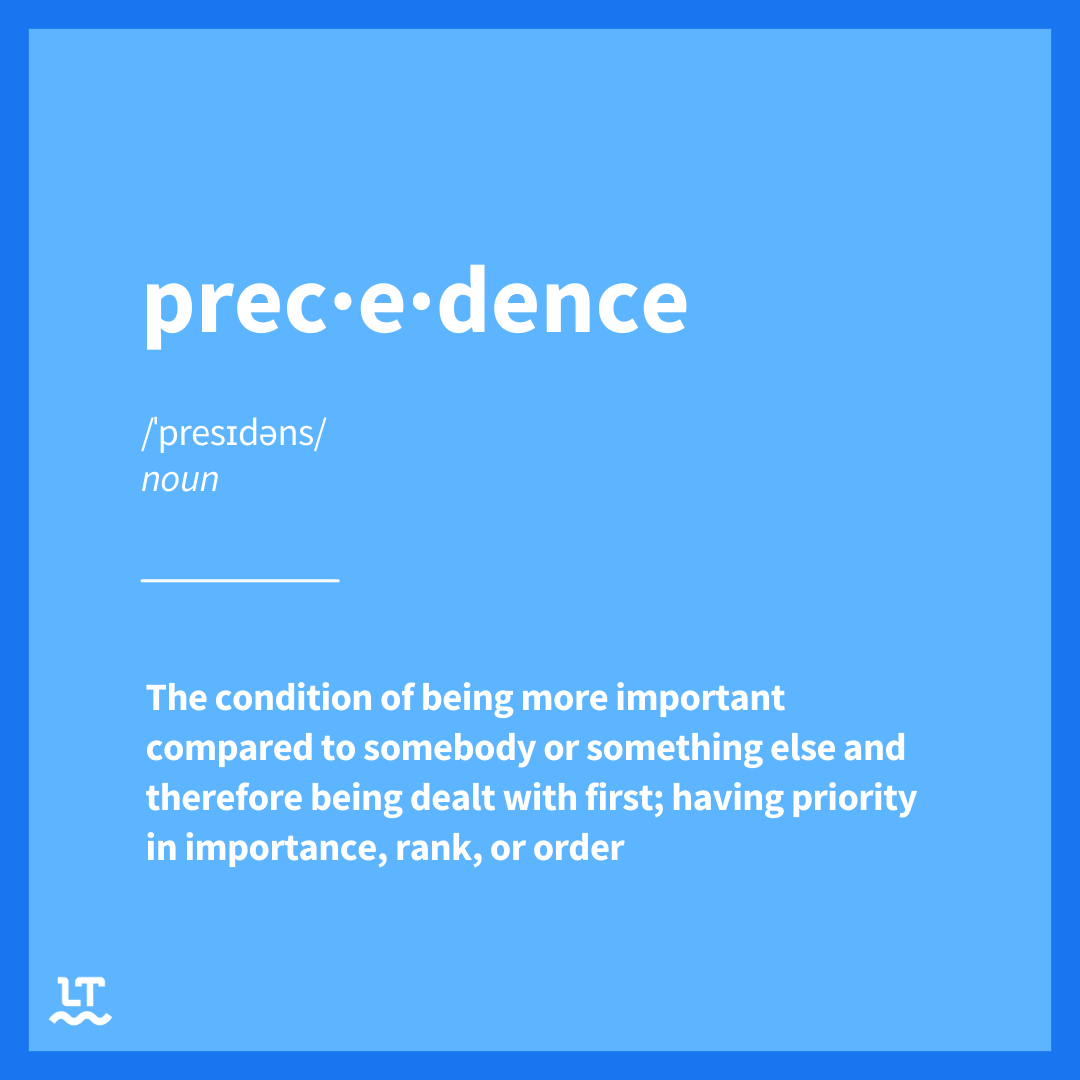“Precedent” vs. “Precedence”: Quick Summary
If something takes precedence over something else, that means it is more important or has a higher priority.
- Writing my dissertation has taken precedence over everything else.
A precedent refers to “an earlier occurrence of something that becomes the example or standard for similar situations in the future.”
- She had established a precedent, and everyone else wanted to follow suit, fearing being left behind.
Table of Contents
Stop what you’re doing!
Reading this blog post takes precedence over all the other tasks you’re working on, as it’ll teach you once and for all the difference between two commonly confused words. We’ll thoroughly review the definitions of precedence and precedent and provide example sentences to show you how to use them.
Let’s dive in!
What Does “Precedence” Mean?
Precedence is a noun that refers to “the condition or quality of being considered more important than somebody or something else.” In other words, precedence is an indication of a higher priority. For example, your younger brother might argue that his birthday party takes precedence over everything, regardless of how expensive it is.
Precedence:

How To Use “Precedence” in a Sentence
The word precedence is often accompanied by the verb take and any of its forms.
If this matter isn’t resolved soon, it will take precedence over everything else we have to finish.
The safety of passengers and crew members takes precedence over all other considerations while on board an aircraft.
Because of his authoritative position in the school, his suggestions have taken precedence over those of faculty and staff.
Getting the perfect gift for our 10th anniversary is slowly but surely taking precedence over all the other tasks I have to complete.
Her desire to write a New York Times bestseller took precedence over several aspects, including her mental health and social life.
However, the use of the word take is not necessary. Below, you’ll find more example sentences that contain the word precedence.
In this company, we believe customer satisfaction has the highest precedence.
The military personnel were introduced in order of precedence.
Environmental sustainability must be given precedence over corporate greed.
What Does “Precedent” Mean?
It’s no wonder that people often mistakenly use precedent in place of precedence. After all, the two words become homophones—in other words, they have identical pronunciations—when one pluralizes precedent by adding an “-s.”
Precedent:
Precedents:
However, precedent carries its own distinct meaning. It’s a noun that refers to “an earlier occurrence of something similar (like an action, decision, or event) that becomes an example that guides subsequent similar circumstances.” If you set a precedent for your dog and sneak him bits of food while you’re having dinner, he’ll know to wait by your side as you eat and will do so for the rest of his life.

How To Use “Precedent” in a Sentence
The word precedent is regularly found in legal contexts. A legal precedent is a previous court decision used as a reference point in deciding the judgment for future similar cases.
Judges have to consider existing precedents before making rulings.
In political settings, a precedent is a past action or decision by government officials that influences how similar situations are handled in the future.
The persecution of political opponents has set a dangerous precedent.
The term precedent can also be used in a broader social context to refer to established customs, traditions, or behaviors that influence how people in a society act or make decisions.
Everyone was shocked when the youngest daughter broke the precedent by pursuing a fashion degree instead of medicine.
Here are a few more example sentences that contain the word precedent:
My older brother’s scholarly achievements have set a precedent of academic excellence for the rest of the family.
The country’s decision to invest heavily in climate innovation has set a precedent that other countries should follow.
As a rebellious child who liked breaking established precedents, I did strange things like using newspapers instead of wrapping paper for presents.
The court’s ruling in this case will establish a precedent for future cryptocurrency cases.
Many precedents were established that day, but none more important than the CEO’s commitment to create a more balanced work environment.
How To Use “Precedence” and “Precedents” Correctly in Your Writing
Remember: precedence has to do with priority, while precedents entail past events that influence future ones.
When it comes to writing, proper spelling and grammar take precedence over everything else. If your text is riddled with errors, the message is weakened, regardless of how truthful and powerful it is.
An easy way to avoid using these words incorrectly is to utilize LanguageTool as your spell and grammar checker. This multilingual writing assistant corrects various errors and enhances style by ensuring optimal word choice.
Try it out today and start writing flawlessly in any of the more than 30 languages and dialects it supports.

